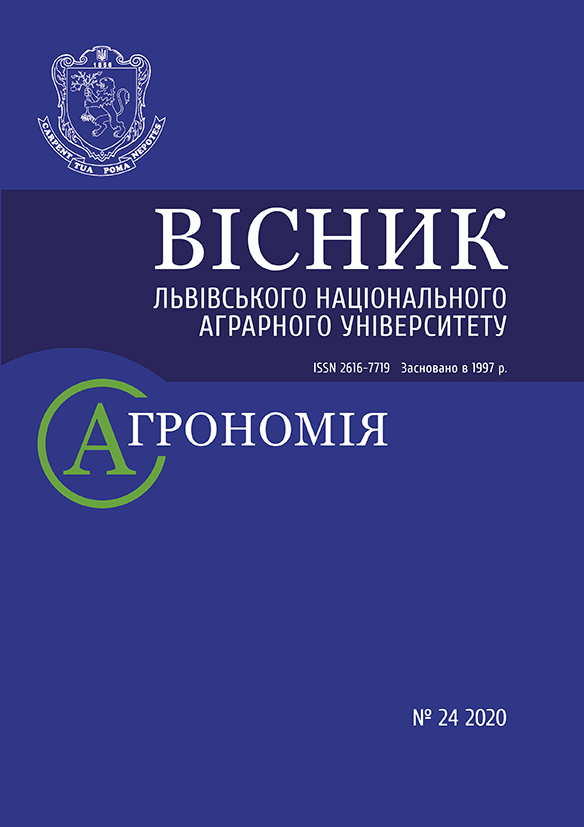Visnyk LNAU: Agronomy 2021 №25: 60-62
FORMATION OF THE SPRING BARLEY YIELD DEPENDING ON CLIMATE CONDITIONS OF THE WESTERN FOREST-STEPPE OF UKRAINE
I. Shuvar, Doctor of Agricultural Sciences
ORCID ID: 0000-0002-4149-1761
H. Korpita, Candidate of Agricultural Sciences
ORCID ID: 0000-0002-0908-0129
O. Dudar, Senior Lecturer
ORCID ID: 0000-0002-7065-6887
Lviv National Agrarian University
https://doi.org/10.31734/agronomy2021.01.060
Annotation
Under the conditions of growing crops, climatic factors are of essential importance as they directly affect the course of processes in the ecosystem. Climatic conditions of the Forest-Steppe zone are characterized by relatively mild winters, moderately humid and warm summers. Such conditions are especially favorable for the formation of high productivity of spring barley in agrocenoses, even under the global climate change. considering the conditions of global climate change, the study of peculiarities of formation of the spring barley yield depending on the climatic conditions of the western Forest-Steppe of Ukraine is of ecological and practical significance.
The aim of the research is to evaluate the effect of temperatures and precipitation during the vegetation period on the level of spring barley yield. To do this, the following task was set, particularly to systematize weather factors over the years of research in accordance with the biological properties of the culture; to make analysis of barley yield; to formulate mathematical equations of the dependence of productivity on the specified factors.
The correlation between spring barley yield formation and climatic factors of the western Forest-Steppe of Ukraine was analyzed. The dependence of spring barley yield on the sum of active temperatures and the amount of precipitation during the growing season was studied.
Evaluation of the relationships between the spring barley productivity, the sum of active temperatures and the amount of precipitation shows the dependence between those factors (R2 = 0.838 – the sum of active temperatures, R2 = 0.892 – the amount of precipitation).
The regression equations showed a significant effect of the rainfall and sum of temperatures during growing season in the formation of the spring barley yield.
Key words
agrophytocenosis, spring barley, functional dependence, climate factors, crop yield
Link
- Final report «On research work on the development of scenarios for climate change in Ukraine in the medium and long term using data from global and regional models». UkrHMI. URL: https://uhmi.org.ua/project/rvndr/climate.pdf (Last accessed: 09.02.2021).
- Hryaznov A. A. Karabalyk barley. Kustanay: Kustanayskyy pechatnyy dvor, 1996. 448 p.
- Karimov H. I., Muravyova O. O. Economic sciences. Mathematical methods in economics. URL: http://www.rusnauka.com/ 21_NNP_2010/Economics/70435.doc.htm (Last accessed: 11.02.2021).
- Korpita H., Shuvar I. Influence of spring barley crop protection on photosynthetic activity. Theory and practice of development of achroindustrial complex and rural areas. Mater. Intern. scientific-practical forum. (September 22–24, 2020). Lviv. 2020. P. 194–196.
- Schelling K. J. Relatioships between yield and quality parameters of malting barley and phonological and metrological data. Aron. And Crop Sci. 2003. No. 2. Р. 113–122.
- Scheu S., Schlitt N., Tunov A. V. et al. Effects of the presence and community composition of earthwoms on microbial community functioning. Oecologia. 2002. No. 133. P. 254–260.
- Scown J., Baker G. The influence of livestock dung on the abundance of exotic and native earthworms in a grassland in south-eastern Australia. Eur J Soil Biol. 2006. No. 42. Р. 310–315.
- Shen Y. Earthworms in traditional Chines medicine (Oligocaea: Lumbricidae, Megascolecidae). Zool Middle East, Suppl. 2010. No. 2. P. 171–173.
- Shuvar I. A., Binert B. I., Korpita H. M. Influence of the system of basic tillage and herbicide on yield and quality of potato tubers in the conditions of the Western Forest-Steppe of Ukraine. Theory and practice of development of agro-industrial complex and rural areas: materials of the XVI International scientific-practical forum. (September 23-25, 2015). Lviv, 2015. P. 60–64.
- Shuvar I. A., Korpita A. M. Agribusiness. Reduce weediness. 2020. No. 3 (62). P. 40–42.
- Shuvar I., Korpita H. Herbological condition and herbicide control of potato agrophytocenosis in the western part of Ukraine. Folia Pomer. Univ. Technol. Stetin., Agric., Aliment., Pisc., Zootech. 2020. No. 355 (54) 2. P. 31–38.
- Shuvar I. A., Korpita H. M., Yunyk A. V. Productivity of spring barley and potatoes in agrocenoses of the Western Forest-Steppe of Ukraine: monograph. Lviv: Ukrainski tekhnolohii, 2019. 150 p.



